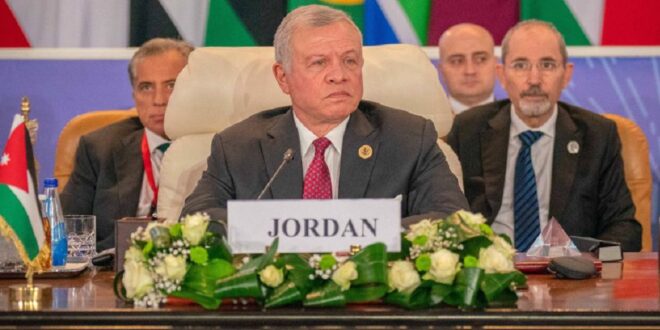Jordan’s King Abdullah this weekend denounced what he termed global silence about Israel’s attacks on Gaza, which have killed thousands of people in the enclave, and left over a million people homeless.
Speaking at a hastily convened meeting dubbed the Cairo Peace Summit, King Abdullah said: “The message the Arab world is hearing is that Palestinian lives matter less than Israeli ones.”
He told Arab leaders present he was outraged and grieved by acts of violence waged against innocent civilians in Gaza, the Israeli-occupied West Bank, and Israel.
“The Israeli leadership must realize once and for all that a state can never thrive if it is built on a foundation of injustice… Our message to the Israelis should be that we want a future of peace and security for you and the Palestinians.”
King Abdullah said that the forced or internal displacement of Palestinians would be a war crime.
Palestinian President Mahmoud Abbas, who also attended the summit, said Palestinians would not be displaced or driven off their land.
“We won’t leave, we won’t leave,” he told the summit.
Egypt, which called the meeting and hosted it, said it had hoped participants would call for peace and resume efforts to resolve the decades-long Palestinian quest for statehood.
But the meeting ended without leaders and foreign ministers agreeing on a joint statement.
This comes two weeks into a conflict that has killed thousands and had a catastrophic impact on the humanitarian situation in Gaza, which is home to 2.3 million people.
Diplomats attending the Cairo talks had not been optimistic of a breakthrough, especially as Israel was not present.
In addition, Israel continues to prepare for a ground invasion of Gaza aimed at wiping out Hamas that rampaged through its towns on October 7, killing 1,400 people.
The Cairo meeting however was meant to explore how to head off a wider regional war but diplomats knew public agreement would be hard because of sensitivities around calls for a ceasefire.
Arab states fear the offensive could drive Gaza residents permanently from their homes and even into neighboring countries – as happened when Palestinians fled or were forced from their homes in the 1948 war following Israel’s creation.
Egyptian President Abdel Fattah al-Sisi said his country opposed what he called the displacement of Palestinians into Egypt’s largely desert Sinai region, adding the only solution was an independent Palestinian state.
Egypt fears insecurity near the border with Gaza in northeastern Sinai, where it faced an insurgency that peaked after 2013 and has now largely been suppressed.
Jordan, home to many Palestinian refugees and their descendants, fears a wider conflagration would give Israel the chance to expel Palestinians en masse from the West Bank.
Saudi Crown Prince calls for establishment of ‘1967 borders’
As concerns grow in the region over Israel’s actions, Saudi Crown Prince Mohammed bin Salman also spoke out his past week about the conflict and rejected the targeting of civilians under any pretext.
Prince Mohammed said during his opening speech at the GCC-ASEAN summit in Riyadh on Friday that there is a need to create conditions that lead to the establishment of a “Palestinian state within the 1967 borders.”
“As we are holding this meeting, we are pained by the escalation of the ongoing violence in Gaza, the price of which is being paid by innocent civilians,” he said.
“In this regard we affirm our rejection of targeting civilians in any way, and the importance of sticking to the international law and the necessity of stopping military operations against civilians and infrastructure that affect their daily lives and creating conditions to restore stability and achieve peace that ensures reaching a solution to establish a Palestinian state according to the pre-1967 borders in a way that achieves security and prosperity for all.
The 1967 borders refer to those that existed before the war in which Israel occupied East Jerusalem, the West Bank and the Gaza Strip. It includes a two-state solution that has long been proposed as the best hope for peace in the Palestine-Israel conflict.
It would see an independent Palestinian state established alongside the existing one of Israel – giving both people their own territory.
This conflict however has deep roots and the creation of Israel and subsequent Arab-Israeli war of 1948 saw many Palestinians forced from their homes, in what is known as the Nakba, or “catastrophe”.
Humanitarian aid
On Sunday, a second convoy of aid trucks entered the Egyptian side of the Rafah border crossing heading towards Gaza, Reuters cited Egyptian security and humanitarian sources at Rafah as saying.
A total of around 19 trucks carrying medical and food supplies had been inspected by UNRWA, the UN’s Palestinian refugee agency, the sources said.
The first convoy of 20 trucks of badly needed supplies entered Gaza on Saturday.
This comes after Israel imposed a total blockade and launched air strikes on Gaza in response to the October 7 attack by Hamas. The Rafah crossing had been out of operation since shortly afterwards, and bombardments on the Gaza side had damaged roads and buildings.
UN officials said however a higher continuous pace of at least 100 trucks a day would be required in Gaza to cover urgent needs. Before the outbreak of the most recent conflict, several hundred trucks had been arriving in the enclave daily.
UN humanitarian chief Martin Griffiths told Reuters on Saturday that work was underway to develop a “light” inspection system, whereby Israel could check the shipments but ensure a sustained flow.
 Eurasia Press & News
Eurasia Press & News




